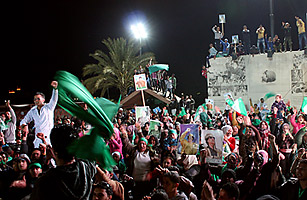
When gunfire breaks out in Tripoli, it pushes a city on edge into paroxysms of speculation and rumor. The gunfire was heard in the early hours of Thursday, and went on in staccato bursts for a little more than an hour. It took place outside the Rixos Hotel, where the journalists stay, which is just a few minutes’ walk to Muammar Gaddafi’s Bab al Aziziya compound. Witnesses to the aftermath described “pools of blood” on the streets. “But you won’t find anything now,” a resident, who cannot be named in order to protect his safety, told me a few hours later. “The fire trucks came to hose it all down.” A friend quipped, “They probably used shampoo to make sure they got it all up.” Dark humor has become the trademark of Libyans in a town with little reasons to laugh.
The fight, I was told, took place between a small band of rebel boys from the restive neighborhoods of Tajoura and Souk al Juma, armed with stolen weapons, and Gaddafi’s volunteer militia — civilians given arms by the government. The reasons are unclear. The Libyan speaking to me surmised that the rebels, some 30 in total, were attempting to make a show of force at the gate to Gaddafi’s compound, but no one knows for sure. What is clear, he told me, is what happened next: the security forces intervened, stopped the fighting and captured the rebels. The Libyan, who comes from those neighborhoods, didn’t think any had been killed, though there had been plenty of injuries he said.
At a press conference that evening, Government Spokesman Moussa Ibrahim swatted away questions about the early morning conflagration. “I always try to advise my friends not to celebrate by shooting in the air,” he sighed with mock exasperation. “But it is a genuine Arab tradition. As far as I know there was no fighting in Tripoli last night. People heard good news, so they were shooting in the air.” The good news? There had been no airstrikes on the city that night.
I asked the Libyan witness to the post-shooting cleanup what he thought would happen to those rebels he said had been captured by the security forces. “They will disappear of course. And next time there is an airstrike, they [the authorities] will bring out their bodies and say they were civilian casualties.” I asked him if he really believed that, or if he was just being cynical. “I believe they will do anything,” he replied.